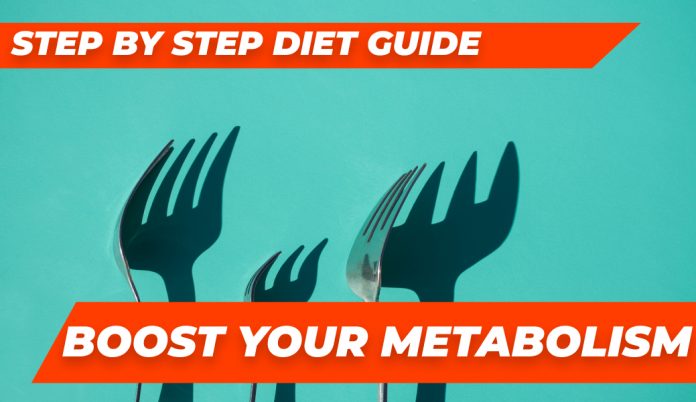A diet for boosting metabolism is one of the most versatile ones. However, the principle of this type of food is evident – eat more often, and you will be happy. However, in reality, it’s not that simple. Let us consider what a metabolism accelerating diet is and how to follow it so as not to harm the body.
Metabolism Boost
Many factors influence the metabolic rate. They must be taken into account by anyone who intends to practice a diet to boost metabolism.
Here is the list of these factors that should be taken into consideration:
- the glycemic index (GI) of products so as not to damage the pancreas;
- the glycemic load (GL), which reduces the total strain on the liver;
- the initial readiness of the body for such a diet;
- the initial metabolic rate;
- objectives. For weight gain, you need one diet, and for weight loss – a completely different one. Not caloric intake alone will differ, but other indicators as well;
- macronutrient composition of the product;
- balancing at a more specified level, be it the balance between Omega-3 and Omega-6 fats, or the combination of fast and slow proteins;
- the presence of additional factors that can slow down or boost the metabolism.
Other factors also affect metabolism, but these are the most important.
Before continuing with the peculiarities of the diet, we will debunk popular myths regarding metabolic processes.

Myth Number One – Boosting Metabolism Contributes To Weight Loss
First, we’re going to dispel the central myth regarding metabolism and weight. It is believed that the acceleration of metabolism contributes to weight loss. However, this is not true. Acceleration and normalization of metabolic processes are in no way related to weight.
If you accelerate your metabolic processes, hunger will occur more often. For this nutrition plan to work for weight loss, you need to accelerate metabolism only to create an artificial calorie deficit.
Excessive acceleration of metabolism will lead to depletion of the body’s resources, after which adaptation processes will return the body to its previous state. Moreover, often, as a result of such acceleration, various diseases appear. Metabolism will shift to catabolic processes with the accumulation of fat tissue.
Conclusion – the rate of metabolic processes in the body does not affect the total weight. It only adjusts the speed of gaining or losing weight.
Myth Number Two – Slow Metabolism Is A Bad Thing
The second misconception, which people who are far from sports and a healthy lifestyle tend to proclaim – «I have a slow metabolism – this is bad.”
There are several types of metabolism:
- fast;
- accelerated;
- normal;
- balanced.
A fast metabolism is natural for many people. That is, if you are genetically prone to fast metabolism, you do not need to speed it up or slow down, you need to adapt to its features, and thereby maximize the benefit of your peculiar situation.
Accelerated metabolism is an unbalanced one. Yes, you artificially accelerate metabolic processes and make them faster than you would typically do. However, sooner or later, it will slow down anyway.
A balanced metabolism is a stage that follows after any sudden violation of the pace of metabolism. It doesn’t matter if you artificially accelerated the metabolism to lose weight, or vice versa, slowed it down to save the energy in the muscles after completing the course of anabolic hormones.
A balanced metabolism is a tendency of the body to return to its normal condition.
If you want to lose weight or gain muscle mass, you do not need to boost metabolism or attempt to balance it. It is enough for you to normalize the metabolic processes (for this, there are specific nutrition plans with their own principles).
How to Build a Nutrition Plan To Boost Metabolism
Diet alone does not guarantee results.
Certain conditions should be observed and provided:
- Sufficient mobility. It can be either strength training or just long and intense walks. It is necessary so that the body has time to spend the accumulated energy and improve energy metabolism in all body structures;
- Quality sleep. While sleeping, all metabolic processes are activated. The artificial slowdown of metabolic processes for a time balances the body, thereby allowing you to give additional acceleration during the day.
- Do not forget about the balance between anabolism and catabolism.
Now let’s move on to the principles themselves of constructing a nutrition plan to accelerate metabolism to get rid of fat reserves in the body quickly.
These rules will help accelerate the metabolism to the limit, and do this with as little recoil as possible:
- Eat more often. It doesn’t matter if you increase the total calorie intake, or vice versa, reduce it. Try to eat at least 6-7 times a day. This will boost metabolic processes by an average of 70%. This is already enough for many people with a slow metabolism. In this case, it is not necessary to try to make every meal as big as possible. You can make one meal big, while all remaining 5-6 meals maybe just a single apple each.
- Eat separately. The fermentation of food occurs due to the production of special secretions in the stomach. If you strive for separate nutrition, the body will be able to prioritize the allocation of enzymes, which will accelerate the digestion of food and reduce the load on the liver and gastrointestinal tract. In turn, this means that such food will have more GI and less GL.
- Chew more thoroughly. No matter how strange it may sound, the truth from childhood that you need to chew food thoroughly really affects the metabolic rate—chewing signals the stomach that food will soon start to enter the body. The stomach begins to actively secrete digestive substances, which cease to be produced immediately after swallowing. Besides, chewing leads to the fact that complex carbohydrates dissolve into simple ones, turning them into glucose.
- Eat less fatty foods. The amount of fat, including trans fats, should not exceed 15-20% of the total caloric intake. All this is since fats require additional transport proteins, the lack of which can, for some time, completely reduce the rate of metabolic processes to almost zero.
- Consume more liquid. It affects the general level of primary urea and blood density. Of course, you should not increase water consumption to 8 liters. It is enough to drink 2-3 liters of water, not counting the liquid from soups, coffee, and tea. In this case, the body’s urge to normalize the water-salt balance will lead to an boost of metabolic processes.
- As many simple carbs as possible, try to consume carbohydrates in each complex meal. The «simpler» they are, the more your metabolism will accelerate. If your goal is to gain mass, do not limit yourself. If you aim to boost metabolism for weight loss, carefully monitor the calorie content of carbs included in the diet.
- Shift metabolic balance towards anabolism. Only by maintaining a high level of anabolic reactions will you maintain a high metabolic rate. To do this, consume as many «fast» (e.g., whey) proteins as possible.
Useful Tips
This hint is that certain products that will help dramatically accelerate the metabolic processes in the body.
- Caffeine products. Caffeine is not only a powerful fat burner. Its main effect is to accelerate the heart muscle, which increases the speed of blood flow through the vessels, and as a result, changes the metabolic balance;
- Adrenaline stimulants. These include such things as taurine, ephedrine, salbutamol, etc. Of course, they are not suitable for boost metabolism in order to gain mass, but they can boost metabolism in the short term. Adrenaline is a powerful optimizer that launches catabolic processes with a massive release of energy, but does not slow down metabolic processes at all;
- Protein shakes. Protein shakes are mostly composed of fermented and dried whey protein. They practically do not burden the stomach, but protein absorption provokes glucagon and insulin secretion, which in turn, in the absence of gastric digestion secretions, creates the urge to eat. Sometime after taking a protein shake, you need to close the suddenly formed metabolic window, which in turn leads to a cumulative increase in the number of meals.
- Vitamin C-rich products. Vitamin C is a powerful acid that directly affects the digestive processes, accelerating them, thereby increasing the body’s metabolic rate. ATTENTION! With an excess of vitamin C, spasm of the gastric tract is possible
- Products with a negative caloric content. Usually, these are green vegetables, rich in fiber, thus difficult to digest. If they are used separately from proteins and carbs, then the body’s attempts to break down fiber will lead to an uncontrolled release of digestive secretions, which will increase the speed of metabolic processes.
- Combination of products with different digestion rate. A vivid example is junk food—the combination of trans fats and simple carbs. The outcome is a quick deposition of adipose tissue with a high metabolic rate. But this does not mean that it is necessary to combine harmful products. It is enough to add 2-3 cubes of sugar to each meal after 15-20 minutes.
Products that Boost Metabolism
Products that help to boost the metabolism should have the following characteristics:
- as low as possible GL;
- relatively high GI;
- huge cholesterol content;
- significant water content;
- their caloric content should be half of the one-time norm;
- fewer fats, more carbs;
- easily digested proteins are preferable (dairy products).
Remember, if you finished the meal with a feeling of slight hunger, you would continue to boost the metabolic processes. If each time you are fed up completely, then in attempts to digest a huge excess of calories, the metabolism will gradually slow down, because, under the influence of insulin, an organism that cannot spend all these calories will attempt to preserve it in the form of fat. And even if you have an extremely boost metabolism, in the end, you will only gain extra fat more quickly.
| Product | Water | Proteins | Fat | Carbohydrates | Calories |
| Eggplant | 82.0 | 0.6 | 0.2 | 5.5 | 24 |
| Turnip | 86.5 | 2.2 | 0.2 | 8.2 | 46 |
| Green peas | 80.0 | 5.0 | 0.2 | 24.4 | 62 |
| Natural 2.5% yogurt | 88.0 | 5.0 | 2.5 | 4.5 | 52 |
| Zucchini | 84.0 | 0.6 | 0.4 | 5.6 | 26 |
| White cabbage | 80.0 | 2.8 | – | 5.4 | 28 |
| Red Cabbage | 80.0 | 2.8 | – | 6.2 | 42 |
| Cauliflower | 80.8 | 2.5 | – | 4.8 | 28 |
| Potatoes | 66.0 | 2.0 | 0.2 | 28.6 | 84 |
| Green onions | 82.5 | 2.4 | – | 4.4 | 22 |
| Leek | 86.0 | 4.0 | – | 6.4 | 40 |
| Onions | 86.0 | 2.6 | – | 8.5 | 44 |
| Milk | 88.5 | 2.8 | 4.2 | 4.6 | 58 |
| Dry milk | 4.0 | 25.6 | 25.0 | 48.4 | 465 |
| Carrots | 88.5 | 2.4 | 0.2 | 6.0 | 44 |
| All-purpose flour | 24.0 | 20.4 | 0.8 | 64.2 | 426 |
| Rye flour | 24.0 | 6.8 | 2.2 | 66.8 | 426 |
| Cucumbers | 86.5 | 0.6 | – | 2.8 | 20 |
| Bell pepper | 82.0 | 2.4 | – | 4.6 | 24 |
| Parsley | 85.0 | 4.6 | – | 8.2 | 45 |
| Redish | 84.0 | 2.2 | – | 4.2 | 20 |
| 20% cream | 62.8 | 2.8 | 20.0 | 4.6 | 205 |
| 20% sour cream | 62.6 | 2.8 | 20.0 | 4.2 | 206 |
| Dutch cheese | 48.8 | 26.8 | 26.4 | 0.0 | 462 |
| Swiss cheese | 46.4 | 24.8 | 42.8 | 0.0 | 486 |
| Fatty cottage cheese | 64.6 | 24.0 | 28.0 | 2.4 | 226 |
| Cottage cheese | 66.6 | 28.0 | 0.6 | 2.5 | 86 |
| White bread | 44.4 | 6.6 | 2.4 | 54.4 | 254 |
| Rye bread | 42.4 | 4.6 | 0.6 | 48.8 | 224 |
Haylie Pomroy Diet
What is the essence of the Haylie Pomroy Phased Diet?
It has two basic principles:
- Simplification of nutrition principles. It all comes down to a simple menu for each day.
- A severe calorie deficit does not take into account the basic needs of the body.
Is this diet harmful? Definitely. Since a tight binding to calories often leads to the sensation of hunger, resulting in the maximum inhibition of metabolic processes. However, suppose you’ll consider the menu, adjust the calorie content, and carefully look at the basic principles. In that case, you will notice that they are not at all different from those presented in this article.
In particular, Pomeroy recommends:
- the principle of separated nutrition;
- consuming a lot of protein shakes, which are actually designed to slow down catabolism and reduce the effects of fixed caloric level;
- an increase in the number of meals;
- the presence in the menu of a large number of products with an excess of vitamin C;
- drinking a lot of water.
However, the phase periodization used by Pomroy is not suitable for most people, since it does not take into account the individual characteristics of the body. In this case, the first phases «aimed at calming the adrenal glands» can lead to a slowdown in metabolism and a decrease in the secretion of digestive enzymes, which after a 4-week cycle, while striving to balance metabolic processes, will lead to a rapid decrease of the metabolic rate in general.
Conclusion
How can one boost metabolism and lose weight? One can’t! These concepts are almost entirely unrelated. To speed up the metabolism, you need to adhere to a plan of fractional and frequent nutrition. And to lose weight, you need to follow the principles of caloric deficiency. An excessively fast metabolism will help only if you correctly adjust your diet and cope with a constant feeling of hunger.
Other nutritional methods combine the acceleration of metabolism and acute caloric deficiency. Protein-carbohydrate alteration is an example of such an approach. However, if you boost metabolism without providing a sufficient caloric deficit, you will expect a directly opposite result – the accumulation of excess fat instead of losing weight.



